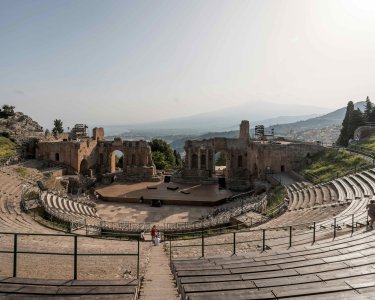Anna Klein
Member
Overview
Ancient theatres were more than performance venues; they were central to civic life and cultural expression in Greek and Roman societies. These structures combined advanced engineering with aesthetic beauty, offering open-air spaces that accommodated thousands of spectators.Their influence is still visible today in the design of modern theatres and amphitheatres worldwide.
Key Features of Ancient Theatres
- Semi-Circular Design:
- Optimal for acoustics and audience visibility.
- The Orchestra:
- Circular or semi-circular space at the center for chorus performances.
- Skene (Stage Building):
- Backdrop for performances, often elaborately decorated.
- Tiered Seating (Cavea):
- Carved into hillsides in Greek theatres; Roman theatres often freestanding.
- Materials:
- Built using stone, marble, and later concrete innovations.
Notable Historic Theatres
- Theatre of Epidaurus (Greece)
- Built: 4th century BC
- Capacity: 13,000–14,000 spectators
- Renowned for its exceptional acoustics.
- Theatre of Dionysus (Athens, Greece)
- Built: 6th century BC
- Birthplace of Greek drama; located at the foot of the Acropolis.
- Roman Theatre of Orange (France)
- Built: Early 1st century AD
- Famous for its intact scaenae frons (stage front).
- Aspendos Theatre (Turkey)
- Built: 2nd century AD
- One of the best-preserved Roman theatres.
- Theatre of Pompey (Rome, Italy)
- Built: 55 BC
- The first permanent theatre in Rome.
Cultural and Urban Impact
- Centers of Culture:
- Hosted drama, music, and civic ceremonies.
- Architectural Innovation:
- Advanced acoustic design and crowd management strategies.
- Enduring Legacy:
- Inspired the design of modern concert halls and stadiums.
- Tourist Attractions:
- Many ancient theatres remain popular historical sites today.
Images of Rome and Greek Theatres
1. Ancient theatre of Taormina Photo by Federico Di Dio photography on Unsplash
Photo by Federico Di Dio photography on Unsplash YouTube Videos
YouTube Videos
- Ancient Theatres and Their Architecture
video by Ancient Athens 3D
- Theatre of Epidaurus: Acoustic Wonders
video by Point of View GR